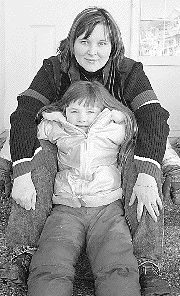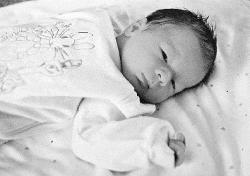Province (Vancouver, B.C.). Friday, 13 February 2004.
Province (Vancouver, B.C.). Friday, 13 February 2004.
The tragic death of their infant son after a routine circumcision in August 2002 still haunts a Vernon couple – who say they weren't properly informed about the signs of danger to watch out for in post-operative care.
A coroner's report released this week into the death of one-month-old Ryleigh McWillis notes that the Penticton Regional Hospital where the circumcision was done has significantly improved the information pamphlet it gives out to all parents, and has changed both follow-up care and documentation for all circumcisions.

Tanna McWillis and daughter Mac-kenna. McWillis's son, Ryan, died from complications following circumcision.
CREDIT: Special to The Province

Tanna McWillis's son, Ryleigh Roman Bryan McWillis, died in August 2002.
CREDIT: Special to The Province
But Tanna McWillis says she and her husband, Brent, a medical professional who worked at the hospital at the time of his son's death, are disappointed that coroner Chico Newell made no other recommendations.
The coroner could have recommended that the hospital and doctor clearly tell parents, 'Any bleeding's bad,' and warn us what to look for. I didn't realize a baby can die from losing as little as one ounce of blood,
McWillis said.
Brent McWillis, a lab technologist, transferred away from the Penticton hospital after the death. The couple, who also have a five-year-old daughter, relocated to Vernon.
Brent still finds it too painful to talk about,
said his 34-year-old wife. The nurses were our friends and a couple of them who tried so hard to saveour baby felt so badly they quit.
The Canadian Pediatric Society takes the position that male circumcision exposes children to risk with no real medical benefits.
Circumcision is no longer covered by medicare in Canada and the numbers of male babies circumcised have been rapidly dropping, down from a decade ago when 60 to 90 per cent of all male babies born in North America were routinely circumcised shortly after birth.
At B.C. Children's Hospital, only 180 male babies were circumcised of the 3,656 boys born in 2002-03 [
![]() Note: or 4.9 percent]
, down from the 274 circumcisions done of 3,544 boys born the previous year [
Note: or 4.9 percent]
, down from the 274 circumcisions done of 3,544 boys born the previous year [![]() Note: or 7.7 percent]
, said hospital spokeswoman Marisa Nichini.
Note: or 7.7 percent]
, said hospital spokeswoman Marisa Nichini.
Dennis Harrison of the Association for Genital Integrity has asked
Amnesty International to protest male circumcision as
unnecessary pain and suffering.
Doctors Against Circumcision has demanded a total ban on circumcision.
But circumcision is required in the Muslim and Jewish faiths, and Jewish mohels use a rapid and safe technique.
Tanna McWillis herself says she and her husband would probably circumcise another male child.
I was told a lot of people opposed to circumcision would grandstand about my son's death, but we would do it again.
If I had been better informed on how to look after my baby, it would never have happened.
Ryleigh Roman Bryan McWillis, born July 21, 2002, was a healthy, normal baby when his parents decided -- just because of family history,
says Tanna – to have him circumcised on Aug. 20.
The doctor used a slightly different procedure than the one described in hospital pamphlets, so the McWillis family wasn't given written information to take home.
Ryleigh was still bleeding at the hospital, but was checked by the doctor and sent home.
He was fussy all that day and a diaper that evening was soaked with blood.
It was pinkish because it was diluted by pee and they hadn't told me what to watch out for,
says Tannis.
Tannis sat up all night holding Ryleigh. When Brent got up at 5 a.m., the baby's diaper was full of blood.
Ryleigh's parents rushed him to the Penticton hospital. By noon, he had to be evacuated by air ambulance to B.C. Children's Hospital. Despite transfusions of blood, saline and antibiotics, the tiny baby was limp, pale and failing.
Ryleigh's prognosis was grim,
notes the coroner's report, and his parents were told of the seriousness of his situation.
Despite massive volume resuscitation,
Ryleigh's organs and heart began to shut down.
And, says his mother, I unplugged his life support at 5 a.m. on the 22nd of August, one month and one day after he was born.
The Circumcision Information and Resource Pages are a not-for-profit educational resource and library. IntactiWiki hosts this website but is not responsible for the content of this site. CIRP makes documents available without charge, for informational purposes only. The contents of this site are not intended to replace the professional medical or legal advice of a licensed practitioner.
© CIRP.org 1996-2026 | Filetree | Please visit our sponsor and host:
IntactiWiki.